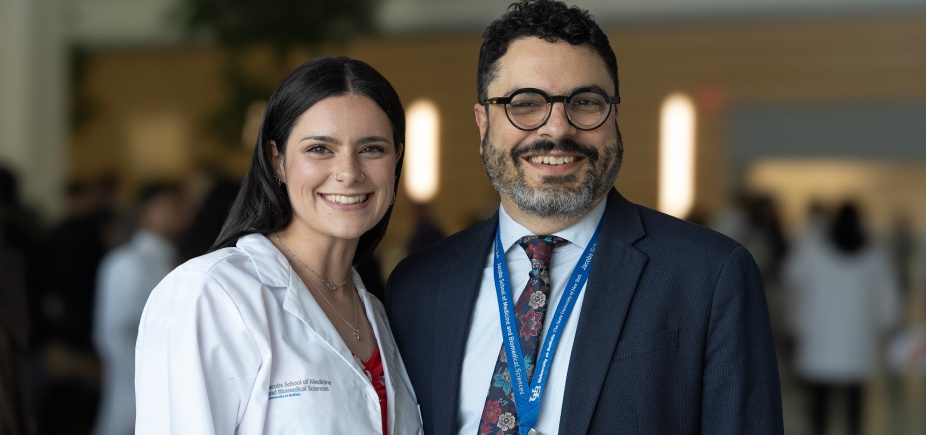Faculty Mentor Development

We believe that mentorship is the cornerstone of academic and professional growth. Our Faculty Mentor Development program is dedicated to empowering faculty to inspire, guide and nurture the next generation of biomedical scientists. Join us in shaping the future through impactful and transformative mentorship.
Mentor Development Series
Jacobs School departments and offices can request the Office of Faculty Affairs to facilitate one of the listed workshop sessions for your group/unit/department. Alternatively, please share your own suggestions for workshop topics.
Upcoming Sessions:
Managing Conflict Within Your Lab Group - Spring 2026
This workshop is designed to explore conflict management styles. We will utilize case studies and guided reflection/discussion to highlight different conflict management styles and how to manage situations in your lab in an equitable manner. Additionally, we will share resources that you can utilize when situations arise within your lab group.
Workshops will be offered on zoom at the following times:
- February 26 at 1 p.m.
- March 3 at noon
- March 10 at noon
Past Sessions:
PERCEIVED APPROACHABILITY IN MENTOR-MENTEE DYNAMICS - FALL 2025 & Spring 2025
This workshop is designed to explore perceptions of approachability within mentor-mentee relationships. Specifically, we will discuss factors that can influence mentorship effectiveness and how to address challenges that impact mentor-mentee interactions. This workshop will highlight small changes in communication and accessibility that can be utilized to strengthen mentorship relationships within your research group.
CREATING INCLUSIVE ENVIRONMENTS AND SUPPORT SYSTEMS FOR TRAINEES - SPRING 2025
This workshop is designed to explore creating inclusive environments and support systems for trainees. In the workshop, we utilize case studies and guided reflections to highlight strategies and approaches for creating an inclusive environment where trainees feel valued and supported. Additionally, we share resources within and outside the school that you can access and utilize in creating a supportive environment for your trainees.
PRINCIPAL INVESTIGATOR ROLES IN MENTORSHIP - SPRING 2025
This workshop is designed to explore the multifaceted roles of a principal investigator--spcifically, the roles of research advisor, mentor, and supervisor. In this workshop, we discuss the distinctions and overlaps between these roles and how to navigate them effectively by reflecting on your own approaches to fostering a productive and supportive research environment.
Past Sessions Based on NIH's Raising a Resilient Scientist Series:
Communication & Work Styles - Spring 2026
This workshop is designed to explore communication and work style differences. Specifically, we will look at how our different communication and work styles influence the way we make decisions and manage conflict. The workshop provides participants with material that helps mentors determine when and how to have conversations that foster an inclusive and successful mentor-mentee relationship.
Difficult conversations, conflict, and feedback – Spring 2024
This session builds a framework for having difficult/uncomfortable conversations, including providing effective feedback. It examines how we decide to engage in difficult./uncomfortable conversations and provides strategies and tools for effective communication under challenging circumstances. Specific issues, such as differences in style or culture, appropriate boundaries and managing challenging interactions are discussed.
Building a welcoming and inclusive research group – Spring 2023
This workshop addresses the effect of bias--both explicit and implicit--on our research groups. It provides strategies to ensure that all trainees are set up for success at work, including welcoming diversity and addressing issues such as stereotype threat, micro-aggressions and attributional ambiguity.
Communication and work styles in research groups - Spring 2022
This workshop is designed to explore communication and work style differences. Specifically, we look at how they influence the way we make decisions and manage conflict. The workshop provides participants with material that helps with decision making of when and how to have a conversation that fosters an inclusive and successful research group.
Literature & Resources
- Aronson, J., & Inzlicht, M. (2004). The ups and downs of attributional ambiguity. Psychological Science, 15, 829-836.
- Crocker, J., Voelkl, K., Testa, M., & Major, B. (1991). Social stigma: The affective consequences of attributional ambiguity. Journal of Personality and Social Psychology, 60, 218-228.
- Duke, L., & Morin, R. (1992, March). Focusing on Race: Candid Dialogue, Elusive Answers. The Washington Post, p. A35.
- Heilman, M. E., Simon, M. C., & Repper, D. P. (1987). Intentionally favored, unintentionally harmed? Impact of sex-based preferential selection on self-perceptions and self-evaluations. Journal of Applied Psychology, 72(1), 62.
- Major, B., & Crocker, J. (1993). Social stigma: The consequences of attributional ambiguity. In D. M. Mackie & D. L. Hamilton (Eds.), Affect, cognition and stereotyping: Interactive processes in group perception (pp. 345-370). Orlando, FL: Academic Press.
- Yeager, D. S., Purdie-Vaughns, V., Garcia, J., Apfel, N., Brzustoski, P., Master, A., ... & Cohen, G. L. (2014). Breaking the cycle of mistrust: Wise interventions to provide critical feedback across the racial divide. Journal of Experimental Psychology: General, 143(2), 804.